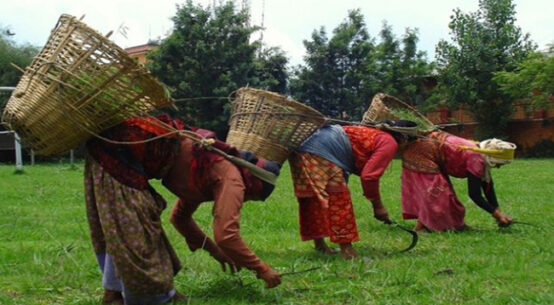
As the fifth round of negotiations of the Intergovernmental Negotiating Committee (INC) for a global plastics treaty concluded in Busan, South Korea (25 November-December 1 2024), the meeting underscored both the complexities and the promises of multilateralism. What we saw in Busan was indicative of other environmental treatymaking spaces, including ones on climate and biodiversity.
There is a stark contrast between countries who are willing to show ambition and those who will engage in obstruction at any cost. This exposes the systemic challenges that both plague and demonstrate the enduring potential of multilateral environmental diplomacy to confront global challenges.
The plastics crisis affects every living being on the planet, becoming an undeniable reality rather than just a collection of statistics or headlines. Every day brings new stories of its impact on our health, environment, and livelihoods. Recognizing the scale of this crisis, countries around the world came together almost three years ago to say enough is enough.
The plastics treaty negotiations are the result of this collective realization, marking a critical step toward addressing a problem that touches every corner of our shared existence.
A 30-foot-high monument entitled Turn off the Plastics Tap by Canadian activist and artist Benjamin von Wong was exhibited at the UN Environment Assembly in Nairobi, Kenya, in 2022. Credit: UNEP/Cyril Villemain
We were supposed to leave Busan with treaty text that would be ready for adoption. But instead, negotiators left without an agreement on the treaty, the barriers ahead are not only procedural or political; they are also philosophical. They reflect a deeper battle between the outdated paradigms of profit-driven growth and the urgent need for a collective reimagining of progress.
Petro-states are continuing to cling to fossil-fueled profits at the expense of collective well-being. It is not merely an economic strategy—it is a moral failure that will damage generations to come!
A Tale of Two Ambitions
Despite significant challenges, the negotiations also showed critical pathways forward. Panama and the Pacific Small Island Developing States (PSIDS) emerged as powerful voices advocating for a global cap on plastic production—a bold proposal that garnered substantial support from 100 countries.
In a decisive show of ambition during the closing plenary, Rwanda, speaking on behalf of 95 nations, championed ambitious controls on plastic production, while Mexico, representing 85 countries, pressed for stringent regulations on chemicals of concern. These elements represent the backbone of a treaty that is fit to overcome the scale of the plastics crisis and deliver meaningful and lasting solutions.
The Shadow of Petrochemical Interests
The petrochemical industry’s influence loomed large over INC-5, with industry representatives forming the largest single delegation at the talks — outnumbering delegations of Indigenous Peoples, scientists, and some countries including the European Union and all of its member states.
This outsized presence underscores the strategic interest of fossil fuel giants toward plastics as renewable energy and progressive climate policies shrink traditional markets.
Petrochemicals, used in everyday products like plastics and medical equipment, are now the largest drivers of global oil demand, surpassing cars and planes. They are projected to account for over a third of oil demand growth by 2030 and nearly half by 2050, adding 7 million barrels of oil and 83 billion cubic meters of natural gas consumption daily by mid-century.
This shift represents a calculated gamble to embed plastics deeper into the global economy, ensuring the fossil fuel industry’s continued dominance despite the environmental and health costs. Yet the environmental and health costs of this strategy are catastrophic. Without significant reductions in plastic production, the sector is poised to consume up to 31% of the remaining carbon budget needed to keep global warming below 1.5°C.
But climate impact is only part of the story. Plastics are fundamentally chemical products, often containing a cocktail of toxic additives that threaten human and planetary health. From endocrine disruptors leaching into water supplies to carcinogens linked to manufacturing processes, the chemical footprint of plastics amplifies the crisis far beyond its carbon implications.
Decarbonizing the plastics industry, as some companies now propose, is a false solution. True solutions must address not only the climate footprint of plastics but also their broader toxic legacy.
An Unfinished Fight
While the Busan meeting failed to produce a treaty, it succeeded in highlighting what must change for future negotiations to succeed. Moreover, it remained successful in retaining the obligations that mattered by countering derailing tactics by certain bad-faith actors. The next resumed session (INC-5.2) offers a critical opportunity to address key sticking points:
- Production Limits: A global cap on plastic production is non-negotiable. Countries must resist attempts to dilute this measure and instead push for clear, enforceable targets.
- Chemical Regulation: The treaty must include robust mechanisms to phase out harmful chemicals in plastics, coupled with transparency and traceability requirements to ensure that people have a right to know what chemicals go into their products.
- Financing Mechanisms: Developing nations are disproportionately affected by plastic pollution and they need financial and technical support to implement treaty obligations. The treaty should be funded by developed countries and should also ensure that the private sector, especially polymer producers, pays its share.
- Inclusivity and Transparency: The exclusion of observers, Indigenous peoples, and civil society from critical stages of the Busan session undermined the treaty’s legitimacy. Future sessions must prioritize meaningful inclusivity and transparency, ensuring that all voices, especially those from Indigenous Peoples and frontline communities, are heard.
Holding Spoilers Accountable
It is imperative to call out countries that continue to obstruct progress in the INC negotiations. Saudi Arabia, Russia, and Iran, among others, self-organized under the so-called “Like-Minded Countries” bloc and have consistently opposed meaningful advances in the treaty process. Their tactics go beyond mere scepticism of the process. They actively undermine the treaty’s ambition and hold back substantive decisions by weaponizing the requirement for consensus in all decisions.
Consensus, while valuable for inclusivity, is being misused as a way to stifle ambition. International precedent, from the Minamata Convention to the Montreal Protocol, demonstrates that incorporating voting as a last resort when countries can otherwise not agree, strengthens negotiation processes and ensures democratic decision-making. Without this safeguard, the plastics treaty risks being shaped by the interests of the few at the expense of the many.
To salvage the treaty’s ambition, the INC must embrace procedural reforms that prioritize efficiency and inclusivity. Voting provisions are essential to overcoming the current impasse and enabling the majority of nations to push forward robust, science-based measures.
A Path Forward
The road to a binding global plastics treaty will not be easy, but the urgency of the crisis leaves no room for complacency. Multilateralism, while imperfect, remains our best hope for tackling global challenges. The successes of past agreements, from the Montreal Protocol to the Minamata Convention, remind us that persistence and ambition can yield transformative results.
We may have left Busan without a treaty — but no treaty was better than a weak one. Civil society, scientists, and progressive nations must rally to maintain pressure, ensuring that the treaty addresses the full lifecycle of plastics—from extraction to disposal—and delivers justice for affected communities. High-ambition country negotiators will have to leave their diplomatic tightropes at home and bring their steel-toed boots to the next session.
In the words of Panama’s lead negotiator, Juan Carlos Monterrey Gomez, “When we reconvene, the stakes will be higher. This is not a drill, this is a fight for survival. We did not accept a weak treaty here, and we never will.”
Dharmesh Shah is Consulting Senior Campaigner with Center for International Environmental Law (CIEL), and coordinator of the Civil Society and Rights Holders Coalition.


